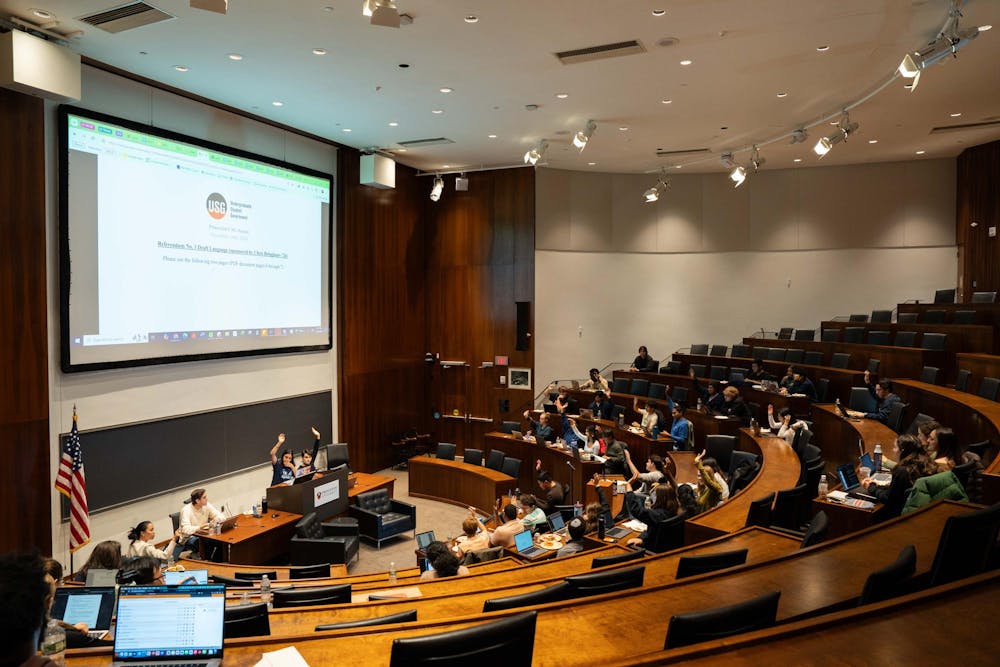At the Nov. 10 Undergraduate Student Government (USG) meeting, members of the Senate unanimously approved the language of all five ballot referenda proposed for the Winter 2024 election. These discussions focused purely on the syntax of how these issues will appear on students’ ballots rather than the merits of presenting them in front of the student body.
Refenda ranged from adding a pass/D/fail option for language classes to student employment, to the University’s ties to Israel’s war in Gaza. Students will be able to cast their ballots for these issues between Nov. 25 and Nov. 27.
At the beginning of Sunday's meeting, USG President Avi Attar ’25 addressed the Senate, explicitly stating the goals and implications of the voting. Attar clarified that language was the only issue that Senate members voting to approve, and members’ vote was not in any way tied to the content of the referendum question.
The final referendum, calling on the trustees and PRINCO to “uphold human rights” by disclosing and divesting holds in weapon manufacturing companies connected to Gaza and sponsored by Givarra Azhar Abdullah ’27, passed without any questions or discussions regarding content or language.
Notably, this lack of discourse over the amendment stands in contrast with a Spring 2022 referendum language review USG meeting, in which the Senate entered a contentious and lengthy debate regarding the content of a referendum calling for the boycott of Caterpillar construction equipment “used in the violation of human rights” in Palestine.
“It’s not the USG or any of its members taking a stance on the substance of a referendum,” Attar said at the meeting. “The question we’re discussing today is fundamentally whether the language of the referendum is such that the student body can vote on it.”
Most of the referenda passed with little discussion and questions focused strictly on language clarifications, rarely veering off into discussions of content. The meeting lasted two and a half hours.
The first referendum, sponsored by Chris Beloglazov ’26, calls on the Office of Housing and Real Estate Services to notify students of fire inspection dates at least one week in advance. The language review passed unanimously and without discussion.

The second, sponsored by Gustavo Blanco-Quiroga ’25, proposes that the University improve employment standards for undergraduate workers by establishing a two-week scheduling notice policy, sending payment to students within one week of the pay period’s end, and raising the undergraduate minimum wage to $18 an hour, among other items.
The language passed unanimously, after a brief discussion about clarifying language on the referendum regarding which jobs constitute “higher-effort” roles on campus and what it means to “recognize” student workers’ contributions to the University.
The third referendum, sponsored by Anna Buretta ’27, asks the trustees of Princeton University to end their practice of accepting research funding from fossil fuel companies that spread disinformation about the climate crisis and lack credible decarbonization plans. The language mentions 1-2019, a USG resolution passed in 2019 that asks the University to engage students in reaching carbon neutrality and addressing climate change, as well as Princeton’s Carbon Mitigation Initiative. Members asked the sponsors to add hyperlinks to the referendum’s language to inform student voters. After that discussion, the referendum language passed unanimously.
The fourth referendum, sponsored by Vivian Bui ’26, proposes that the University adapt the PDF options for 100- and 200-level language courses that will not count toward the A.B. foreign language requirement, a departmental language course, or a minor/certificate language course requirement. After a brief discussion to change the wording to reflect the situation of students taking multiple languages classes at once, the senators unanimously passed the referendum’s language.

USG Senate members told the ‘Prince’ that they made an effort to clarify the purpose of the language review meetings. They felt that the referendum meeting ran more efficiently due to the clarified understanding among USG members that their job was to focus on the language of proposed ballot questions.
Also during the meeting, Vice Provost Jed Marsh spoke about changes made to the seniors’ yearly assessment questionnaire. New questions were added that address protests on campus and how this statistic correlates with students’ sense of belonging on campus. Previous questionnaires have found that students who identify as Black, Latino, or LGBTQ+ reported a lower overall sense of belonging at Princeton.
The next USG meeting will be Sunday, Nov. 17. USG meetings are open for all students to attend and are held on Sundays from 5–6 p.m. in Robertson Hall 016.
Devon Rudolph is a News contributor for the ‘Prince.’
Assistant News Editor Christopher Bao contributed reporting.
Please send any corrections to corrections[at]dailyprincetonian.com.








